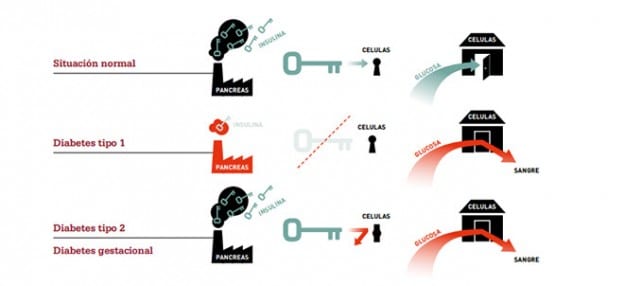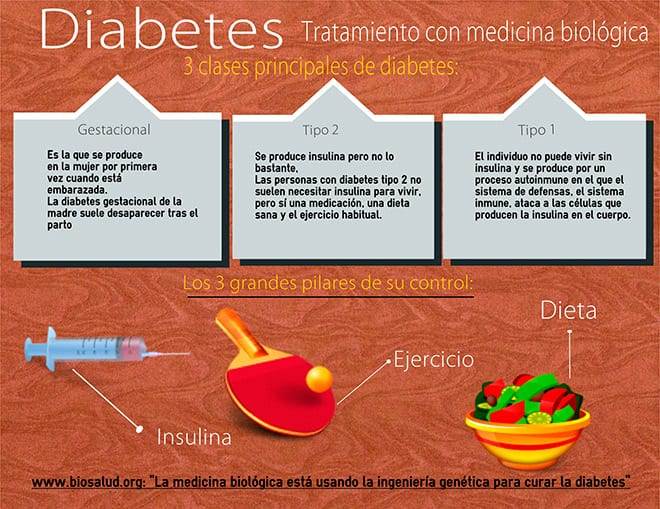
The 3 main types of diabetes are characterised by the body's inability to produce the hormone insulin. in sufficient quantity or the body makes inefficient use of it.
Insulin is a hormone made in the pancreas and is a key to moving glucose from food into the body's cells.where it is converted into energy for muscles and tissues to function properly.
There are three main types of diabetes:
- type 1 diabetes
- type 2 diabetes
- gestational diabetes mellitus (GDM)
Type 1 diabetes
Type 1 diabetes implies that the individual cannot live without insulin and is caused by a autoimmune process in which the defence system, the immune system, attacking cells which produce insulin in the body. The disease can develop at any age but children and young adults are more likely to be affected. A person with type 1 diabetes will die if they do not have insulin. The cause is not known
Some of the symptoms The most commonly known symptoms of type 1 diabetes are frequent urination, thirst, unchanging appetite, tiredness, weight loss and blurred vision.
Healthy nutrition, sport and close medical supervision are key to a normal life for individuals with type 1 diabetes.
Type 2 diabetes
It is the most common type of diabetes, which can go unnoticed by the person for years, while deteriorating the health status of the body.. In this case, insulin is produced but not enough. In many cases, it is diagnosed when the evidence is already clear.
Some of the causes of type 2 diabetes are:
- obesity
- poor nutrition
- No physical activity
- Advanced age
- family history of diabetes
- ethnic origin
- inadequate nutrition during pregnancy, which affects the developing child
People with type 2 diabetes do not usually need insulin to live, but they do need medication, a healthy diet and regular exercise.
Gestational diabetes mellitus (GDM)
This is the first time a woman becomes pregnant. Fortunately, it usually occurs late in pregnancy, so the baby will be at less risk than if the mother had type 1 or 2 diabetes before.
Gestational diabetes in the mother usually disappears after delivery. But it should be noted that women who have had GDM have an increased risk of developing type 2 diabetes over time.
Diabetic complications
When diabetes becomes complicated, health complications can occur, which are summarised in the following points:
- Cardiovascular diseasesThe most common conditions accompanying diabetes are angina pectoris, stroke, myocardial infarction and arterial disease.
- Kidney diseasesKidney disease: With diabetes, the kidneys may become less efficient or fail completely. In other words, nephropathy or kidney disease can occur.
- Eye diseasesEye disease is often a sign that is associated with diabetes, retinopathy will occur, which can lead to visual impairment or even blindness.
- NeuropathyNerve damage in the whole body due to high blood glucose or high blood pressure.
- Diabetic footIt is an important symptom of diabetes. Injuries to nerves and blood vessels cause infections and ulcers that increase the risk of amputation.
- Problems in pregnancyHyperglycaemia in pregnancy can cause changes in the foetus that will lead to weight gain (macrosomia) and overproduction of insulin.
- Oral healthDiabetes increases the risk of gum inflammation or gingivitis in people who do not have good diabetic control.
- Sleep apnoeaRecent research demonstrates the likelihood of a link between type 2 diabetes and obstructive sleep apnoea (OSA), the most common type of sleep disordered breathing.
Diabetes: treatments biological medicine
Insulin was discovered by Frederick Banting and Charles Best in 1921. and provided life and hope for people with type 1 diabetes. Significant advances in research and development have been made, creating genetically engineered human insulin.
In this sense, Biosalud has collaborated with Professor Gustavo Moviglia in Cell Therapy and Tissue Engineering projects., the result of an agreement between our clinic and the Maimonides University.

Doctors at the Maimonides University in Argentina have succeeded in re-secreting insulin and glucagon, starting from stem cells own. As Dr Gustavo Moviglia explains, this is the first time in the world that the body has regained a natural source of insulin and glucagon production and secretion, which are complementary and equally necessary hormones.
We therefore see that biological medicine is using genetic engineering to cure diabetes.
In addition, an Aragonese company related to Biosalud, named Gooddayhas developed a technology in which the diabetic's glucometer is connected via wifi to a intelligent software which has been developed by the same company, with the advice of a team of endocrinologists specialising in Diabetes, so that as soon as the patient measures their blood glucose, the data travels to the software, recording the time, the patient's name and blood glucose, In turn, the software sends a message to the patient's mobile phone indicating good progress, a warning or even a warning to the treating diabetologist if the values indicate that the patient is in danger, so that the doctor can contact the patient and advise him or her directly what to do. This system will be operational at the beginning of the year and will be offered by Biosalud to any diabetic who wants this service in Biosalud en tu casa.

<img src="https://biosalud.org/wp-content/uploads/Diabetestratamientoconmedicinabiolgica.jpg" alt="Diabetes," tratamiento con medicina biológica></a></div>


4 thoughts on “Diabetes, tratamiento con medicina biológica”
Hello! I am eduardo, I am 28 years old, I am from Chile, I have type 1 diabetes, I have had this disease for 19 years and also arterial hypertension, I would like to see the possibility that you could help me as my glycaemia is a little high, fluctuating now between 200 and 300 and my last haemoglobin was 8.5 and my blood pressure is very unstable, I would like to see the possibility that you could guide me on how to follow a more rigorous and efficient control.
attentive to comments
Best regards
Good morning Eduardo. We have passed your query to the clinic. Best regards
I have type 2 diabetes
Thank you for your response Oswaldo. The medical team will contact you shortly. Best regards
Comments are closed.